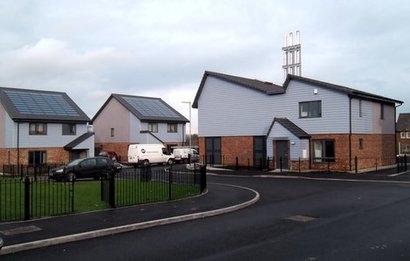
The new Living Lab of connected homes is now truly open, interoperable and scalable, enabling innovative products, services and business models to be tested and integrated with mainstream smart heating controls, smart meters, IoT devices, and electric vehicle chargers.
In particular, the Catapult is interested in speaking to Electric Vehicle Smart Charging companies that are keen to launch or scale new products, to join the likes of leading smart home firm, tado°, which has installed their zonal heating controls into a significant number of Living Lab homes.
The upgraded Living Lab, with new digital integration platform developed by SysMech, enables:
Energy suppliers to trial energy service propositions with mainstream smart home controls
Products to be installed quickly and easily into homes using the new digital integration platform to ensure interoperability
Access to a wealth of consumer and technical data, to rapidly design, market-test and launch smart energy innovations
Behind-the-meter flexibility to be tested
Testing of the value of new business models with real consumers.
The relaunch follows soon after the Prime Minister’s Council for Science & Technology named the Living Lab as a key place to run “trials and experimentation to understand user behaviours and responses to technologies, particularly as the use of decentralised and digitalised technology changes the energy system”.
The Living Lab will also work with innovators to provide insights and evidence to Government and Regulators to influence new market arrangements, policies and regulations to ensure UK business can capitalise on clean growth as we accelerate efforts to decarbonise the UK energy system.
“The Living Lab is a national asset that provides energy innovators with a safe, affordable, shared space to the test, demonstrate, de-risk and scale-up” said Rebecca Sweeney, Energy Systems Catapult business lead for the Living Lab. “During lockdown we have invested in a new digital integration platform that enables us to quickly and easily install both new innovations and off-the-shelf products. The digital integration platform is like a universal adapter, offering interoperability – physically, digitally, and commercially – between the smart heating control systems and IoT devices being used by Living Lab homes. Data from these in-home devices can be streamed and analysed by our data scientists, while our consumer insights team is available to provide a richer picture of how the people within the Living Lab are interacting with the innovative products and services. At the same time as the new platform was being developed, we were upgrading homes with new smart heating controls. For this initial phase we selected tado° and have been impressed with both the usability of the tado° system and the support received when integrating their technology into the Living Lab. It’s an exciting time for the Living Lab as we develop this national capability to test and demonstrate energy innovations, market arrangements, policy and regulations with real consumers – to accelerate to a Net Zero carbon future”.
tado° Co-founder and Chief Product Officer, Christian Deilmann, added that the impact of COVID-19 has further accelerated consumer demand for smart energy-efficient solutions at home and that Living Lab, supported by the Prime Minister’s Council for Science & Technology, is helping to demonstrate the real value that smart technology can bring to homes and the environment as a whole.
The Living Lab is a 100-home test environment for businesses to trial new Net Zero products and services with people in homes upgraded with room-by-room sensors and smart heating controls. Producing a wealth of data, our experts help innovators rapidly design, market-test and launch smart energy products and services. This allows innovators and businesses to collect integral data from real life contexts.
Significant improvements and upgrades have recently been made to the Living Lab, which is now operating as an open, truly interoperable and scalable digital integration platform to trial innovative new products, services and business models, including integration with mainstream smart heating controls, smart meters, IoT devices, and EV smart chargers.
For additional information:

